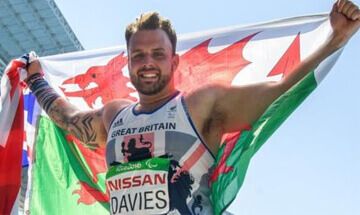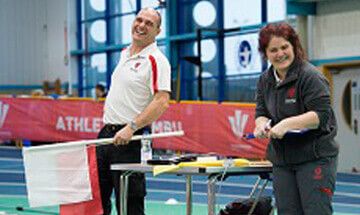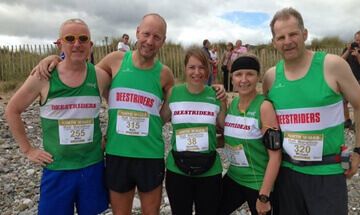
Steve Barry
Steve Barry
Of the eleven Welsh athletes to have won a Commonwealth Games gold medal, Cardiff’s Steve Barry is probably the least known. Yet he was one of Britain’s elite athletes in the 1980’s and won the athlete of the match award for breaking the British 10k walk record in Britain’s match against East Germany in 1982. He set seven UK records in a glittering career to establish him as one of the all-time greats of Welsh athletics.
Steve’s Commonwealth triumph came in the 1982 Brisbane Games when he took the 30km walk title to cement his status as Britain’s top race walker. This is the last time an international title has been won by a British male walker.
His Brisbane win made him a star in Wales and among his many awards was being inducted as the BBC Wales Sports Personality of The Year – the ultimate sports award in Wales. In winning, he followed in the footsteps of the all-time greats of Welsh Sport, such as Dame Tanni Grey Thompson, Colin Jackson, Lynn Davies, Shane Williams, and Gareth Edwards to name just a few. Steve is one of only nine Welsh athletes to have won the accolade since its inception in 1954 when Olympic silver medallist and 44 times capped rugby star Ken Jones won the award.
Born in Cardiff on 25 October 1950, Steve was the son of the late Dai Barry, a prominent Welsh race walker and all-round sportsman who won nine Welsh walking titles in the 1950s. Steve used to go and watch his father compete so it was probably inevitable that he would become interested in athletics. But it was not until 1978 that he started to make an impact when he collected his first Welsh titles, taking the honours at both 3k and 10k. He repeated this double in 1979 and 1980 and it was in the latter year that he won the first of his AAA (British) titles with a victory over 3k. However, he failed to make the 1980 Moscow Olympic team, only finishing 6th in the 20k trials.
1981 was a significant one for Steve as he emerged as a walker of genuine world class. However, he suffered one frustrating experience when he was disqualified after the finish of the AAA (British) 3k but went on to win the 10k titles at both the AAA and the UK Championships. His victory in the Lugano (effectively the World Championships of walking) semi-final in 1981 is the last Lugano race won by a British walker.
It was in 1981 that he set the first of his British records when in an international track race in Brighton on 27 June he covered 13,987 metres in an hour, breaking Phil Embleton’s record of 1972, and carried on to clock 1:26:22 for 20k beating the record established by the 1964 Olympic 20k champion Ken Matthews in 1964. The latter mark gave him immense satisfaction, as Matthews was a man much admired by Steve and one of those who gave him inspiration in his early days.
By now Steve was the dominant force in British race walking and he swept all before him in 1982. He signalled his intentions early on with a brace of British records. In a 30k road race at Douglas, Isle of Man, he recorded 2:15:11 to knock over 4 minutes off the record set in the corresponding race in the previous year. In a 10k track race at West London in March he registered 41:14.7 to claim Phil Embleton’s 11-year-old record and by now he held UK records at 10k, 20k and 30k. Later that year he brought his UK record 10k time down to 41:13.62 when finishing 3rd in a match against East Germany. He scored another 3k/10k double in the Welsh Championships, retained both his AAA and UK titles and won Race Walking Association (RWA) Championships over 10 miles and 20k.
After finishing a disappointing 11th over 20k in the 1982 European Championships in Athens that September, Steve’s outstanding year came to a fitting climax when he was crowned Commonwealth 30k Champion in Brisbane in October. In beating a world-class field he led from the first feeding station and won by over 2 minutes. Walking at just under 7 minutes a mile, he demolished the Games record by almost 12 minutes to record 2:10:16, shattering his own British record. His victory is the only major international title ever won by a Welsh race walker.
Steve carried on in 1983 where he had left off the previous year. He began with another early season trip to Douglas and, racing over 20k on the road, he recorded 1:22:51 breaking Paul Nihill’s British record of 1972. He also won the British AAA and UK 10k track titles for the third year in succession and retained both his RWA titles at 10 miles and 20k.
The lure of the Olympics was enough to persuade Steve, now 33, to carry on for another season in 1984. He won the Welsh 10k for the fifth time to bring his total of Welsh titles to nine (one more than his father) and past his best, was duly selected for the Los Angeles Games where he finished 24th over 20k to bring his illustrious career to a close.
Steve is very much an athlete’s athlete, and totally unassuming. This can be illustrated when he set that British record for the 10k in Britain’s match against East Germany in 1982. He dashed up to Crystal Palace in his van after work on the Friday evening, changed in his van in the car park, got on with the race and immediately returned home to Cardiff afterwards, only to discover when he got home that he had been awarded the man of the match award!
Altogether in his career, Steve set seven British records (his “record” 40:54.7 set in 1983 winning the AAA title was subsequently discovered to be a short course) and won numerous UK and RWA titles – a feat that is unlikely to be repeated. In 2013, almost 30 years after he retired, he still holds all of the Welsh race walking records between 10 and 30k – a clear indication of his outstanding ability.
His main club was the now defunct Roath Labour Walking Club in Cardiff which was one of Britain’s leading walking clubs for many years. He was also a member of Cardiff AAC.
He was inducted into the Welsh Athletics Hall of Fame in 2010.
Jack Thomas and Clive Williams, October 2013
Featured links
Useful pages within this section you may like to consider visiting.


